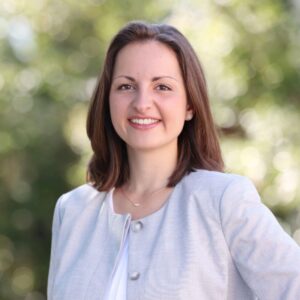Remziye Wessel, a graduate student in the Dolatshahi lab, has won the Jill E. Hungerford Award for 2025. This award is given annually to a doctoral student who exemplifies a commitment, achievement, and passion for research aimed at broadening scientific knowledge.
 Remziye is a current PhD student in Biomedical Engineering at UVA. She earned a bachelor of science degree in mechanical engineer and studio art from Lafayette College.
Remziye is a current PhD student in Biomedical Engineering at UVA. She earned a bachelor of science degree in mechanical engineer and studio art from Lafayette College.
We asked Remziye to tell us about her research and her hopes for the future. Here’s what she said:
Can you tell us about your research?
My research investigates mechanisms and dynamic regulation of placental antibody transfer from mothers to babies across gestation using a combination of mathematical modeling, in vitro experiments, and high-throughput image analysis of human placental tissue. During pregnancy, maternal antibodies are actively transferred across the placenta, providing humoral immune protection to newborns who are otherwise very vulnerable to infections. There have been a lot of recent discoveries demonstrating how the placenta acts like a sieve to selectively transfer antibodies that not only neutralize pathogens, but also engage effector immune cells to fight disease. This is therapeutically relevant because over the last decade, several vaccines—such as SARS-Cov-2 vaccines—have been approved for pregnant women to boost pathogen-specific antibody transfer. Our computational model demonstrated how the rate of transfer is limited by the expression of antibody-binding Fc receptors in the placenta, and that antibody transfer is a function of receptors expression, maternal antibody levels, and the affinity of the Fc receptor-antibody interactions. Studies from our human cohort have revealed that Fc receptor expression is dynamic across gestation, potentially highlighting a window of opportunity when maternal vaccination results in optimal immune transfer. Overall, my research has shed light on how antibody transfer is temporally regulated, insights that can be leveraged to improve the formulation and administration timing of maternal vaccines.
What drives or motivates your scientific pursuits?
Human biology is beautifully complex. Coming from a more traditional engineering background, I love the challenge of using math and engineering principles to make sense of complicated physiological systems. I am motivated to use this unique skill set to positively impact vulnerable patient populations including, but not limited to, pregnant women and very young babies.
What are your future goals?
I hope to be a principal investigator at an academic institution so I can continue to have an impact through both research and mentorship. Immediately after graduating this summer, I am going to train as a postdoc with Doug Lauffenburger at MIT where I will investigate the role of the immune system in reproductive pathologies using computational and experimental methods.
Congratulations on winning this award, Remziye!
